fairly--quite--rather--very-与-pretty的用法区别
英语程度副词
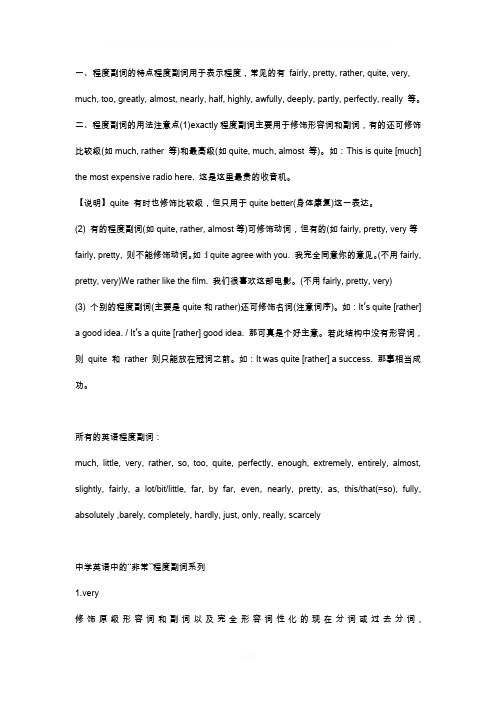
一、程度副词的特点程度副词用于表示程度,常见的有fairly, pretty, rather, quite, very, much, too, greatly, almost, nearly, half, highly, awfully, deeply, partly, perfectly, really 等。
二、程度副词的用法注意点(1)exactly程度副词主要用于修饰形容词和副词,有的还可修饰比较级(如much, rather 等)和最高级(如quite, much, almost 等)。
如:This is quite [much] the most expensive radio here. 这是这里最贵的收音机。
【说明】quite 有时也修饰比较级,但只用于quite better(身体康复)这一表达。
(2) 有的程度副词(如quite, rather, almost等)可修饰动词,但有的(如fairly, pretty, very等fairly, pretty, 则不能修饰动词。
如:I quite agree with you. 我完全同意你的意见。
(不用fairly, pretty, very)We rather like the film. 我们很喜欢这部电影。
(不用fairly, pretty, very)(3) 个别的程度副词(主要是quite和rather)还可修饰名词(注意词序)。
如:It’s quite [rather]a good idea. / It’s a quite [rather] good idea. 那可真是个好主意。
若此结构中没有形容词,则quite 和rather 则只能放在冠词之前。
如:It was quite [rather] a success. 那事相当成功。
所有的英语程度副词:much, little, very, rather, so, too, quite, perfectly, enough, extremely, entirely, almost, slightly, fairly, a lot/bit/little, far, by far, even, nearly, pretty, as, this/that(=so), fully, absolutely ,barely, completely, hardly, just, only, really, scarcely中学英语中的“非常”程度副词系列1.very修饰原级形容词和副词以及完全形容词性化的现在分词或过去分词,如:tired,ashamed,exciting等【注意】1)非形容词性化的分词不能用very修饰,可用much修饰.例:She is very pleased by his words.(×)She is much pleased by his words.(√)2)一些不分等级的形容词不能用very修饰,可用quite(completely)修饰.例:You are very wrong.(×)You are quite wrong.(√)3)部分以a开头的形容词不能用very修饰,可用much修饰.例:She was very afraid of dogs.(×)She was much afraid of dogs.(√)2.much1)修饰动词;2)修饰介词以及形容词和副词的比较级;例:a)The girl is much like her mother.这女孩非常像她妈妈。
浅谈程度副词 fairly,quite,rather,pretty和very的用法及差异
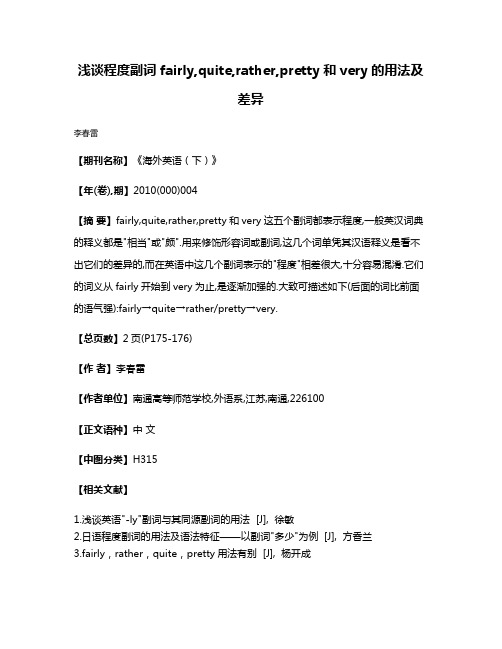
浅谈程度副词 fairly,quite,rather,pretty和very的用法及
差异
李春雷
【期刊名称】《海外英语(下)》
【年(卷),期】2010(000)004
【摘要】fairly,quite,rather,pretty和very这五个副词都表示程度,一般英汉词典的释义都是"相当"或"颇".用来修饰形容词或副词,这几个词单凭其汉语释义是看不出它们的差异的,而在英语中这几个副词表示的"程度"相差很大,十分容易混淆.它们的词义从fairly开始到very为止,是逐渐加强的.大致可描述如下(后面的词比前面的语气强):fairly→quite→rather/pretty→very.
【总页数】2页(P175-176)
【作者】李春雷
【作者单位】南通高等师范学校,外语系,江苏,南通,226100
【正文语种】中文
【中图分类】H315
【相关文献】
1.浅谈英语"-ly"副词与其同源副词的用法 [J], 徐敏
2.日语程度副词的用法及语法特征——以副词"多少"为例 [J], 方香兰
3.fairly,rather,quite,pretty用法有别 [J], 杨开成
4.浅谈程度副词 fairly,quite,rather,pretty和very的用法及差异 [J], 李春雷
5.fairly,rather,quite,pretty用法有别 [J], 杨开成
因版权原因,仅展示原文概要,查看原文内容请购买。
fairly--quite--rather--very-与-pretty的用法区别
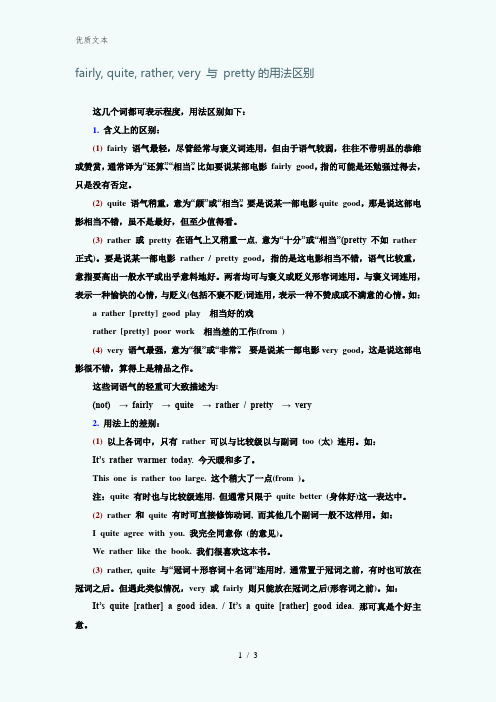
fairly, quite, rather, very 与pretty的用法区别这几个词都可表示程度,用法区别如下:1.含义上的区别:(1)fairly语气最轻,尽管经常与褒义词连用,但由于语气较弱,往往不带明显的恭维或赞赏,通常译为“还算”、“相当”。
比如要说某部电影fairly good,指的可能是还勉强过得去,只是没有否定。
(2)quite语气稍重,意为“颇”或“相当”。
要是说某一部电影quite good,那是说这部电影相当不错,虽不是最好,但至少值得看。
(3)rather或pretty在语气上又稍重一点,意为“十分”或“相当”(pretty不如rather 正式)。
要是说某一部电影rather / pretty good,指的是这电影相当不错,语气比较重,意指要高出一般水平或出乎意料地好。
两者均可与褒义或贬义形容词连用。
与褒义词连用,表示一种愉快的心情,与贬义(包括不褒不贬)词连用,表示一种不赞成或不满意的心情。
如:a rather [pretty] good play 相当好的戏rather [pretty] poor work 相当差的工作(from )(4)very语气最强,意为“很”或“非常”。
要是说某一部电影very good,这是说这部电影很不错,算得上是精品之作。
这些词语气的轻重可大致描述为:(not) → fairly → quite → rather / pretty → very2.用法上的差别:(1)以上各词中,只有rather可以与比较级以与副词too (太)连用。
如:It’s rather warmer today.今天暖和多了。
This one is rather too large.这个稍大了一点(from )。
注:quite有时也与比较级连用,但通常只限于quite better (身体好)这一表达中。
(2)rather和quite有时可直接修饰动词,而其他几个副词一般不这样用。
fairly,quite,rather和very的区别

1、语气由弱到强2、quite可修饰无比较级的adj. / adv. (如:right, mistaken, dead, possible等)It is quite impossible to start at once.3、rather可跟比较级和与too连用。
It’s rather warmer.She was rather too late.4、rather与quite可修饰动词或放在名词前。
I rather like her.I quite agree with you.It’s rather a pity.He gave us quite a surprise.She is quite a beauty.5、very可修饰最高级或与first, last, own 等连用。
She has the very best quality.It’s six o’clock at the very latest.He is the very first man to arrive.This is the very last drop.6、very可与sorry, glad或much等连用。
I am very sorry to hear the news.Thank you very much.7、fairly修饰动词时表示“公正地,公平地”。
You must treat her fairly.8、very修饰名词时是形容词,意思是“正是的”,“恰好的”。
This is the very thing I want.9、rather可放在不定冠词之前或之后,但必须放在定冠词the 之后。
fairly,very放在冠词之后。
quite放在冠词之前。
He is rather a tall boy .= He is a rather tall boy.He is the rather tall boy.This is a fairly easy book.She is quite a good player.He is the very man I’m looking for.10、quite可与another, a few, a lot of 等连用。
fairly,rather ,quite,与pretty 的区别

ratherprettygoodplay一出相当好的戏贬义词或可褒可贬的词连用时表示不赞成或不满意
Fairly, pretty, rather, quite的用法区别 1:按语气强弱排列依次为,fairly<rather<quite<pretty
ቤተ መጻሕፍቲ ባይዱ
fairly 语气最弱;pretty语气最强,也最通俗。
4:rather 和 quite与 “不定冠词加形容词加名词”连用时 可置于不定冠词之前:
rather/quite a nice day 十分晴朗的一天 a rather/quite nice day 十分晴朗的一天
2:fairly 多与褒义词连用 fairly tidy,spacious,friendly.挺整洁,宽敞,热情。 试比较: rather untidy,cramped,unfriendly 很零乱,狭窄, 冷淡。 3:只有rather可以与比较级的词语和too连用 The house is rather bigger than we thought. 这所房子比我们想象的大得多。 These shoes are rather too small. 这双鞋未免太小了。
Fairly

Fairly ,quite, rather ,pretty这四个词的意思都是"很,非常",都可以用来改变形容词和副词的份量。
1.Fairly在这四个词中份量最轻,如果你说某人fairly nice 或fairly pretty,那几乎算不上恭维。
如果说一部电影fairly good,那意思是"勉强还可以看";但不值得跑那么远的路去看,等等。
Quite在份量上比fairly稍强。
如果你认为某部电影quite good,那就意在推荐。
它相当于汉语的"十分,完全",用来加强语气;当它与有比较级的形容词、副词连用于表相当,还算,此时它在程度上比fairly强,但不及rather, pretty或very。
Quite不用来修饰比较级,但表示身体康复时可说quite better,完全康复了。
Rather 相当于more than usually expected,表示的程度很重。
在使用它的时候要注意:a. rather修饰的形容词如果后面有一个可数名词时,不定冠词置于rather 之前,也可放于其后(与quite 的用法一样)。
如:a rather large crowd/rather a large crowda quite large crowd/quite a large crowdb. rather 常用来修饰一些表示"不好"的形容词或副词,fairly只宜修饰表示"好"的形容词或副词,只是程度上不如rather强;rather 也可修饰表示"好"的形容词或副词表示"很,相当"。
Rather可以与too 连用,fairly 不能接too; rather可以修饰比较级,fairly 不能。
Pretty 和rather, very 意思相同,如果把这几个词按程度由弱到强排列的话,从"无"到"最"的情况如下:not→fairly→quite→rather→very。
fairly, quite, rather, pretty, very单词辨析

1.单词辨析:fairly, quite, rather, pretty, veryFairly, quite, rather,pretty and very are all used to say that something is true to some degree, butnot completely or extremely : 这几个词都被用来说某事真实到某种程度,但还不到完全或极端的程度(一般是用来修饰形容词、副词、名词)。
比如:She's rather shy.You should find the test fairly easy.|It took quite a long time (NOT a quite long time).His English is pretty good.Rather is fairly formal but can be used in spoken English, especially British English. In American Englishit is more usual to use pretty . In both American and British English, pretty is more usual in speech th an in writing. (rather用法相当正式,可以用到口语中,特别是英国英语中。
在美国英语中使用pretty更为常见。
无论是英国英语还是美国英语中,pretty在口语中要比在书面语中更为常见。
)Quite can also be used in front of an adjective or adverb,;and in British English used infront of a verb, it means 'completely' or “absolutely”. This is a fairly formal use(在英国英语中,quite可以用在一个形容词或副词前,其意思是“相当、颇、的确”;用到动词前的意思相当于“completely”或“absolutely”,即“完全""绝对"之意。
fairly-quite-rather和very的区别

fairly, quite, rather, very “很”“十分”“相当”1、语气由弱到强2、quite可修饰无比较级的adj. / adv. (如:right, mistaken, dead, possible等)It is quite impossible to start at once.3、rather可跟比较级和与too连用。
It’s rather warmer.She was rather too late.4、rather与quite可修饰动词或放在名词前。
I rather like her.I quite agree with you.It’s rather a pity.He gave us quite a surprise.She is quite a beauty.5、very可修饰最高级或与first, last, own 等连用。
She has the very best quality.It’s six o’clock at the very latest.He is the very first man to arrive.This is the very last drop.6、very可与sorry, glad或much等连用。
I am very sorry to hear the news.Thank you very much.7、fairly修饰动词时表示“公正地,公平地”。
You must treat her fairly.8、very修饰名词时是形容词,意思是“正是的”,“恰好的”。
This is the very thing I want.9、rather可放在不定冠词之前或之后,但必须放在定冠词the 之后。
fairly,very放在冠词之后。
quite放在冠词之前。
He is rather a tall boy .= He is a rather tall boy.He is the rather tall boy.This is a fairly easy book.She is quite a good player.He is the very man I’m looking for.10、quite可与another, a few, a lot of 等连用。
表示程度的副词英语

表示程度的副词英语副词是英语语法中的一类词性,它们通常用来修饰动词、形容词、其他副词或整个句子。
在英语中,有许多副词可以用来表示程度,这些副词可以帮助我们更准确地表达自己的意思。
本文将介绍一些常用的表示程度的副词。
1. VeryVery是一个常见的副词,用来表示强烈程度或程度的高低。
例如:- I am very happy today.(我今天非常开心。
)- The weather is very cold.(天气非常寒冷。
)- She is very talented.(她非常有才华。
)2. ExtremelyExtremely是一个比very更强烈的副词,用来表示程度的极限。
例如:- The food is extremely delicious.(这种食物非常美味。
) - The movie was extremely boring.(这部电影非常无聊。
)- I am extremely tired.(我非常疲惫。
)3. QuiteQuite是一个多义的副词,可以表示程度的高低、相当程度或完全程度。
例如:- The party was quite loud.(这个派对相当吵闹。
)- She is quite beautiful.(她非常漂亮。
)- I'm quite sure I left my keys on the table.(我非常确定我把钥匙放在桌子上了。
)4. RatherRather是一个含义类似于quite的副词,用来表示相当程度或完全程度。
例如:- The test was rather difficult.(这个考试相当难。
)- He is rather tall.(他相当高。
)- We were rather disappointed with the service.(我们对服务感到相当失望。
)5. FairlyFairly是一个用来表示相当程度的副词,含义与quite和rather 相似。
英语程度副词

一、程度副词的特点程度副词用于表示程度,常见的有fairly, pretty, rather, quite, very, much, too, greatly, almost, nearly, half, highly, awfully, deeply, partly, perfectly, really 等。
二、程度副词的用法注意点(1)exactly程度副词主要用于修饰形容词和副词,有的还可修饰比较级(如much, rather 等)和最高级(如quite, much, almost 等)。
如:This is quite [much] the most expensive radio here. 这是这里最贵的收音机。
【说明】quite 有时也修饰比较级,但只用于quite better(身体康复)这一表达。
(2) 有的程度副词(如quite, rather, almost等)可修饰动词,但有的(如fairly, pretty, very等fairly, pretty, 则不能修饰动词。
如:I quite agree with you. 我完全同意你的意见。
(不用fairly, pretty, very)We rather like the film. 我们很喜欢这部电影。
(不用fairly, pretty, very)(3) 个别的程度副词(主要是quite和rather)还可修饰名词(注意词序)。
如:It’s quite [rather]a good idea. / It’s a quite [rather] good idea. 那可真是个好主意。
若此结构中没有形容词,则quite 和rather 则只能放在冠词之前。
如:It was quite [rather] a success. 那事相当成功。
所有的英语程度副词:much, little, very, rather, so, too, quite, perfectly, enough, extremely, entirely, almost, slightly, fairly, a lot/bit/little, far, by far, even, nearly, pretty, as, this/that(=so), fully, absolutely ,barely, completely, hardly, just, only, really, scarcely中学英语中的“非常”程度副词系列1.very修饰原级形容词和副词以及完全形容词性化的现在分词或过去分词,如:tired,ashamed,exciting等【注意】1)非形容词性化的分词不能用very修饰,可用much修饰.例:She is very pleased by his words.(×)She is much pleased by his words.(√)2)一些不分等级的形容词不能用very修饰,可用quite(completely)修饰.例:You are very wrong.(×)You are quite wrong.(√)3)部分以a开头的形容词不能用very修饰,可用much修饰.例:She was very afraid of dogs.(×)She was much afraid of dogs.(√)2.much1)修饰动词;2)修饰介词以及形容词和副词的比较级;例:a)The girl is much like her mother.这女孩非常像她妈妈。
英语程度副词

一、程度副词的特点程度副词用于表示程度,常见的有fairly, pretty, rather, quite, very, much, too, greatly, almost, nearly, half, highly, awfully, deeply, partly, perfectly, really 等。
二、程度副词的用法注意点(1)exactly程度副词主要用于修饰形容词和副词,有的还可修饰比较级(如much, rather 等)和最高级(如quite, much, almost 等)。
如:This is quite [much] the most expensive radio here. 这是这里最贵的收音机。
【说明】quite 有时也修饰比较级,但只用于quite better(身体康复)这一表达。
(2) 有的程度副词(如quite, rather, almost等)可修饰动词,但有的(如fairly, pretty, very等fairly, pretty, 则不能修饰动词。
如:I quite agree with you. 我完全同意你的意见。
(不用fairly, pretty, very)We rather like the film. 我们很喜欢这部电影。
(不用fairly, pretty, very)(3) 个别的程度副词(主要是quite和rather)还可修饰名词(注意词序)。
如:It’s quite [rather] a good idea. / It’s a quite [rather] good idea. 那可真是个好主意。
若此结构中没有形容词,则quite 和rather 则只能放在冠词之前。
如:It was quite [rather] a success. 那事相当成功。
所有的英语程度副词:much, little, very, rather, so, too, quite, perfectly, enough, extremely, entirely, almost, slightly, fairly, a lot/bit/little, far, by far, even, nearly, pretty, as, this/that(=so), fully, absolutely ,barely, completely, hardly, just, only, really, scarcely中学英语中的“非常”程度副词系列1.very修饰原级形容词和副词以及完全形容词性化的现在分词或过去分词,如:tired, ashamed, exciting等【注意】1) 非形容词性化的分词不能用very修饰, 可用much修饰.例:She is very pleased by his words. (×)She is much pleased by his words. (√)2) 一些不分等级的形容词不能用very修饰, 可用quite (completely) 修饰.例:You are very wrong. (×)You are quite wrong. (√)3) 部分以a 开头的形容词不能用very修饰, 可用 much修饰.例:She was very afraid of dogs. (×)She was much afraid of dogs. (√)2. much1) 修饰动词;2) 修饰介词以及形容词和副词的比较级;例:a) The girl is much like her mother. 这女孩非常像她妈妈。
英语语法 什么是程度副词
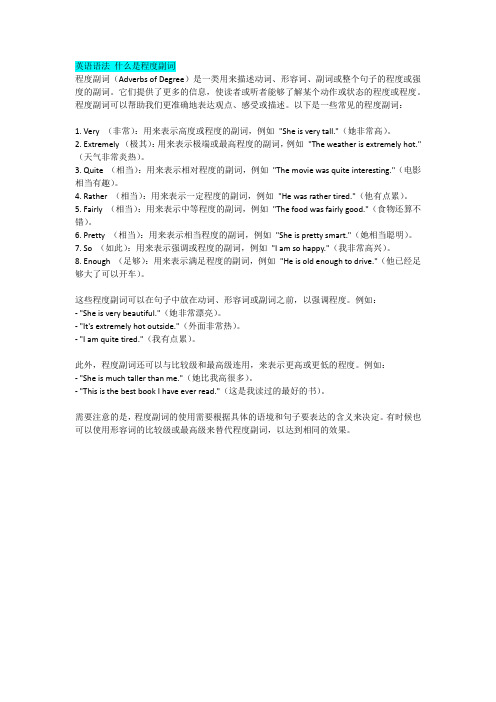
英语语法什么是程度副词程度副词(Adverbs of Degree)是一类用来描述动词、形容词、副词或整个句子的程度或强度的副词。
它们提供了更多的信息,使读者或听者能够了解某个动作或状态的程度或程度。
程度副词可以帮助我们更准确地表达观点、感受或描述。
以下是一些常见的程度副词:1. Very (非常):用来表示高度或程度的副词,例如"She is very tall."(她非常高)。
2. Extremely (极其):用来表示极端或最高程度的副词,例如"The weather is extremely hot."(天气非常炎热)。
3. Quite (相当):用来表示相对程度的副词,例如"The movie was quite interesting."(电影相当有趣)。
4. Rather (相当):用来表示一定程度的副词,例如"He was rather tired."(他有点累)。
5. Fairly (相当):用来表示中等程度的副词,例如"The food was fairly good."(食物还算不错)。
6. Pretty (相当):用来表示相当程度的副词,例如"She is pretty smart."(她相当聪明)。
7. So (如此):用来表示强调或程度的副词,例如"I am so happy."(我非常高兴)。
8. Enough (足够):用来表示满足程度的副词,例如"He is old enough to drive."(他已经足够大了可以开车)。
这些程度副词可以在句子中放在动词、形容词或副词之前,以强调程度。
例如:- "She is very beautiful."(她非常漂亮)。
- "It's extremely hot outside."(外面非常热)。
英语副词词汇辨析方法

英语副词词汇辨析方法副词在英语语法中起到修饰动词、形容词、副词以及整个句子的作用。
准确使用副词词汇是提高英语表达能力的重要一环。
然而,由于副词的种类繁多,容易引发混淆和错误使用。
本文将介绍几种常见的英语副词词汇并讨论它们的辨析方法。
一、程度副词1. very:非常,常用来修饰形容词或副词,表示高度程度。
2. quite:相当,用于修饰形容词或副词,表达程度较高但没有达到极限。
3. rather:相当,用于修饰形容词或副词,意味着相对程度较高。
4. pretty:相当,通常修饰形容词,表示程度比较高但程度低于very。
5. fairly:相当,修饰形容词或副词,程度介于不高不低。
6. extremely:极其,用于修饰形容词或副词,表示程度非常高。
二、方式副词1. carefully:小心地,表示动作或行为小心细致。
2. quickly:快速地,表示动作或行为迅捷。
3. easily:容易地,表示动作或行为容易实现。
4. thoroughly:彻底地,表示动作或行为完全无遗漏。
5. quietly:安静地,表示动作或行为悄无声息。
三、时间副词1. always:总是,在过去、现在和未来都普遍存在。
2. often:经常,表示频率很高。
3. sometimes:有时候,表示不确定的时间。
4. hardly:几乎不,表示极少或接近于没有。
5. never:从不,表示永远没有发生过或不可能发生。
四、地点副词1. here:这里,在附近的地方。
2. there:那里,在离说话人较远的地方。
3. everywhere:到处,在每个地方。
4. nowhere:无处,在任何地方都没有。
五、频率副词1. always:总是,表示永恒的频率。
2. often:经常,表示频繁的频率。
3. sometimes:有时候,表示偶尔的频率。
4. rarely:很少,表示罕见的频率。
5. never:从不,表示完全没有的频率。
fairly quiet very区别

fairly, quite, rather, very “很”“十分”“相当”1、语气由弱到强2、quite可修饰无比较级的adj. / adv. (如:right, mistaken, dead, possible等)It is quite impossible to start at once.3、rather可跟比较级和与too连用。
It’s rather warmer.She was rather too late.4、rather与quite可修饰动词或放在名词前。
I rather like her.I quite agree with you.It’s rather a pity.He gave us quite a surprise.She is quite a beauty.5、very可修饰最高级或与first, last, own 等连用。
She has the very best quality.It’s six o’clock at the very latest.He is the very first man to arrive.This is the very last drop.6、very可与sorry, glad或much等连用。
I am very sorry to hear the news.Thank you very much.7、fairly修饰动词时表示“公正地,公平地”。
You must treat her fairly.8、very修饰名词时是形容词,意思是“正是的”,“恰好的”。
This is the very thing I want.9、rather可放在不定冠词之前或之后,但必须放在定冠词the 之后。
fairly,very放在冠词之后。
quite放在冠词之前。
He is rather a tall boy .= He is a rather tall boy.He is the rather tall boy.This is a fairly easy book.She is quite a good player.He is the very man I’m looking for.10、quite可与another, a few, a lot of 等连用。
fairlyquiterather及very的用法区别

r
l
,
qu ite
,
ra
th
e r
及
v e r
y
的 用 法 区 别 刘 洪
.
波
这 四个词 周时都是表程度 的 剧词
一 定的主观色彩
.
.
且语义 含糊
.
灵活多变
使用时常 带 有
.
所越
.
要 十 分确切地 区 分 这四 书 司是 很不 容 易的
笔 者 拟从
似 下 几 个方面加 以区 别 :
一
,
、
程度 不同
、
文患 作文
P
a
.
求解 四 用 词典 》 及
/ v e
英语 用法指南
,
,
,
5. 8)
q u i te
、
r a
t
h叮 可直接修饰动词
u
f
i r l了
较少
,
r
r
则不能 南》
,
例如
:
t 1 q ie
11肠 b
,
e r
(见
《 英语用法指
p 肠 。 了)
.
1 do
一
n
t q
u
te 玉
a
g
r e
, i th
yo
d
.
r r 比e a
.
常用 以 修饰一 些 表示不偷快的 形容词
It ’ 5
r
例如
5 q
o
:
t a
he
r
帕l d
r
t h i:
m
o r n
iu g
.
( 见 费 致德
fairly,quite,rather和very的区别

fairly, quite, rather, very “很”“十分”“相当”1、语气由弱到强2、quite可修饰无比较级的adj. / adv. (如:right, mistaken, dead, possible等)It is quite impossible to start at once.3、rather可跟比较级和与too连用。
It’s rather warmer.She was rather too late.4、rather与quite可修饰动词或放在名词前。
I rather like her.I quite agree with you.It’s rather a pity.He gave us quite a surprise.She is quite a beauty.5、very可修饰最高级或与first, last, own 等连用。
She has the very best quality.It’s six o’clock at the very latest.He is the very first man to arrive.This is the very last drop.6、very可与sorry, glad或much等连用。
I am very sorry to hear the news.Thank you very much.7、fairly修饰动词时表示“公正地,公平地”。
You must treat her fairly.8、very修饰名词时是形容词,意思是“正是的”,“恰好的”。
This is the very thing I want.9、rather可放在不定冠词之前或之后,但必须放在定冠词the 之后。
fairly,very放在冠词之后。
quite放在冠词之前。
He is rather a tall boy .= He is a rather tall boy.He is the rather tall boy.This is a fairly easy book.She is quite a good player.He is the very man I’m looking for.10、quite可与another, a few, a lot of 等连用。
英语程度副词

一、程度副词的特点程度副词用于表示程度,常见的有fairly, pretty, rather, quite, very, much, too, greatly, almost, nearly, half, highly, awfully, deeply, partly, perfectly, really 等。
二、程度副词的用法注意点(1)exactly程度副词主要用于修饰形容词和副词,有的还可修饰比较级(如much, rather 等)和最高级(如quite, much, almost 等)。
如:This is quite [much] the most expensive radio here. 这是这里最贵的收音机。
【说明】quite 有时也修饰比较级,但只用于quite better(身体康复)这一表达。
(2) 有的程度副词(如quite, rather, almost等)可修饰动词,但有的(如fairly, pretty, very等fairly, pretty, 则不能修饰动词。
如:I quite agree with you. 我完全同意你的意见。
(不用fairly, pretty, very)We rather like the film. 我们很喜欢这部电影。
(不用fairly, pretty, very)(3) 个别的程度副词(主要是quite和rather)还可修饰名词(注意词序)。
如:It’s quite [rather]a good idea. / It’s a quite [rather] good idea. 那可真是个好主意。
若此结构中没有形容词,则quite 和rather 则只能放在冠词之前。
如:It was quite [rather] a success. 那事相当成功。
所有的英语程度副词:much, little, very, rather, so, too, quite, perfectly, enough, extremely, entirely, almost, slightly, fairly, a lot/bit/little, far, by far, even, nearly, pretty, as, this/that(=so), fully, absolutely ,barely, completely, hardly, just, only, really, scarcely中学英语中的“非常”程度副词系列1.very修饰原级形容词和副词以及完全形容词性化的现在分词或过去分词,如:tired,ashamed,exciting等【注意】1)非形容词性化的分词不能用very修饰,可用much修饰.例:She is very pleased by his words.(×)She is much pleased by his words.(√)2)一些不分等级的形容词不能用very修饰,可用quite(completely)修饰.例:You are very wrong.(×)You are quite wrong.(√)3)部分以a开头的形容词不能用very修饰,可用much修饰.例:She was very afraid of dogs.(×)She was much afraid of dogs.(√)2.much1)修饰动词;2)修饰介词以及形容词和副词的比较级;例:a)The girl is much like her mother.这女孩非常像她妈妈。
fairly, quite, rather, pretty,very用法区别
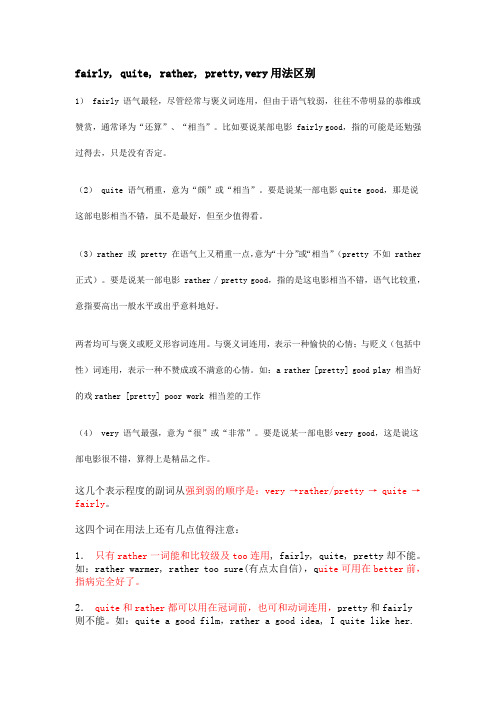
fairly, quite, rather, pretty,very用法区别1) fairly 语气最轻,尽管经常与褒义词连用,但由于语气较弱,往往不带明显的恭维或赞赏,通常译为“还算”、“相当”。
比如要说某部电影 fairly good,指的可能是还勉强过得去,只是没有否定。
(2) quite 语气稍重,意为“颇”或“相当”。
要是说某一部电影quite good,那是说这部电影相当不错,虽不是最好,但至少值得看。
(3) rather 或 pretty 在语气上又稍重一点,意为“十分”或“相当”(pretty 不如 rather 正式)。
要是说某一部电影 rather / pretty good,指的是这电影相当不错,语气比较重,意指要高出一般水平或出乎意料地好。
两者均可与褒义或贬义形容词连用。
与褒义词连用,表示一种愉快的心情;与贬义(包括中性)词连用,表示一种不赞成或不满意的心情。
如:a rather [pretty] good play 相当好的戏rather [pretty] poor work 相当差的工作(4) very 语气最强,意为“很”或“非常”。
要是说某一部电影very good,这是说这部电影很不错,算得上是精品之作。
这几个表示程度的副词从强到弱的顺序是:very →rather/pretty → qui t e → fairly。
这四个词在用法上还有几点值得注意:1.只有rather一词能和比较级及too连用, fairly, quite, pretty却不能。
如:rather warmer, rather too sure(有点太自信),q uite可用在better前,指病完全好了。
2.quite和rather都可以用在冠词前,也可和动词连用,pretty和fairly则不能。
如:quite a good film,rather a good idea, I quite like her.或I rather enjoy doing nothing.3. quite, fairly,和rather也可放在a/an后,但名词前必须有形容词时。
有两种形式副词的意义辨析
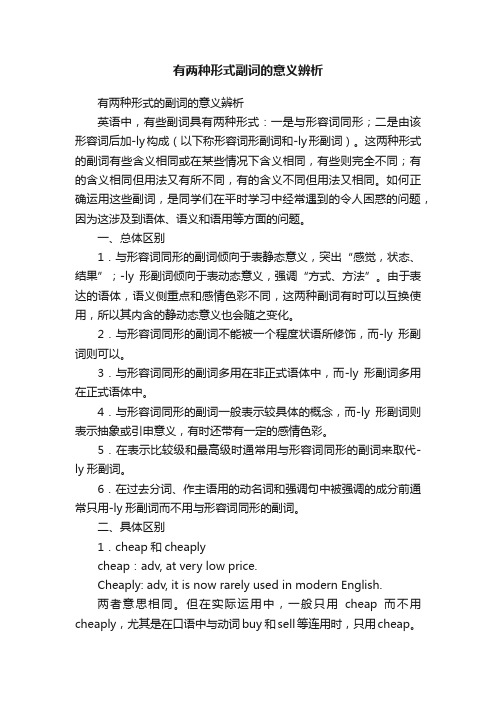
有两种形式副词的意义辨析有两种形式的副词的意义辨析英语中,有些副词具有两种形式:一是与形容词同形;二是由该形容词后加-ly构成(以下称形容词形副词和-ly形副词)。
这两种形式的副词有些含义相同或在某些情况下含义相同,有些则完全不同;有的含义相同但用法又有所不同,有的含义不同但用法又相同。
如何正确运用这些副词,是同学们在平时学习中经常遇到的令人困惑的问题,因为这涉及到语体、语义和语用等方面的问题。
一、总体区别1.与形容词同形的副词倾向于表静态意义,突出“感觉,状态、结果”;-ly形副词倾向于表动态意义,强调“方式、方法”。
由于表达的语体,语义侧重点和感情色彩不同,这两种副词有时可以互换使用,所以其内含的静动态意义也会随之变化。
2.与形容词同形的副词不能被一个程度状语所修饰,而-ly形副词则可以。
3.与形容词同形的副词多用在非正式语体中,而-ly形副词多用在正式语体中。
4.与形容词同形的副词一般表示较具体的概念,而-ly形副词则表示抽象或引申意义,有时还带有一定的感情色彩。
5.在表示比较级和最高级时通常用与形容词同形的副词来取代-ly形副词。
6.在过去分词、作主语用的动名词和强调句中被强调的成分前通常只用-ly形副词而不用与形容词同形的副词。
二、具体区别1.cheap和cheaplycheap:adv, at very low price.Cheaply: adv, it is now rarely used in modern English.两者意思相同。
但在实际运用中,一般只用cheap而不用cheaply,尤其是在口语中与动词buy 和sell等连用时,只用cheap。
例如:He sold the house very cheap.Air fares to Africa don’t come cheap.They are selling meat cheap when it gets dark.2.clean和cleanlyclean: adv, used to emphasize the fact that an action or movement is complete or through.表示“完全、彻底地”的意思时,常与动词forget,介词over和through,副词away和out连用,Cleanly: quickly and smoothly with a single movement.干净,利索,其他的动词、介词和副词常与cleanly搭配使用。
- 1、下载文档前请自行甄别文档内容的完整性,平台不提供额外的编辑、内容补充、找答案等附加服务。
- 2、"仅部分预览"的文档,不可在线预览部分如存在完整性等问题,可反馈申请退款(可完整预览的文档不适用该条件!)。
- 3、如文档侵犯您的权益,请联系客服反馈,我们会尽快为您处理(人工客服工作时间:9:00-18:30)。
fairly, quite, rather, very 与pretty的用法区别
这几个词都可表示程度,用法区别如下:
1.含义上的区别:
(1)fairly语气最轻,尽管经常与褒义词连用,但由于语气较弱,往往不带明显的恭维或赞赏,通常译为“还算”、“相当”。
比如要说某部电影fairly good,指的可能是还勉强过得去,只是没有否定。
(2)quite语气稍重,意为“颇”或“相当”。
要是说某一部电影quite good,那是说这部电影相当不错,虽不是最好,但至少值得看。
(3)rather或pretty在语气上又稍重一点,意为“十分”或“相当”(pretty不如rather 正式)。
要是说某一部电影rather / pretty good,指的是这电影相当不错,语气比较重,意指要高出一般水平或出乎意料地好。
两者均可与褒义或贬义形容词连用。
与褒义词连用,表示一种愉快的心情,与贬义(包括不褒不贬)词连用,表示一种不赞成或不满意的心情。
如:
a rather [pretty] good play 相当好的戏
rather [pretty] poor work 相当差的工作(from )
(4)very语气最强,意为“很”或“非常”。
要是说某一部电影very good,这是说这部电影很不错,算得上是精品之作。
这些词语气的轻重可大致描述为:
(not) → fairly → quite → rather / pretty → very
2.用法上的差别:
(1)以上各词中,只有rather可以与比较级以及副词too (太)连用。
如:
It’s rather warmer today.今天暖和多了。
This one is rather too large.这个稍大了一点(from )。
注:quite有时也与比较级连用,但通常只限于quite better (身体好)这一表达中。
(2)rather和quite有时可直接修饰动词,而其他几个副词一般不这样用。
如:
I quite agree with you.我完全同意你(的意见)。
We rather like the book.我们很喜欢这本书。
(3)rather, quite与“冠词+形容词+名词”连用时,通常置于冠词之前,有时也可放在冠词之后。
但遇此类似情况,very或fairly则只能放在冠词之后(形容词之前)。
如:It’s quite [rather] a good idea. / It’s a quite [rather] good idea.那可真是个好主意。
注:若此结构中没有形容词,则quite和rather则只能放在冠词之前。
如:
It was quite [rather] a success.那事相当成功(from )。
(4)修饰不可分级的形容词(如:right, wrong, ready, full, empty, perfect, impossible, alone, unique等,通常只用quite,此时quite并不表示“相当”或“很”,而表示“完全”。
如:You’re quite right (wrong).你完全正确(错了)。
That’s quite impossible.那完全不可能。
一)fairly, quite, rather, pretty这几个副词均可表示“适度地”、“在某种程度上”或“不很”的意思,常用以改变所修饰的形容词或副词的分量。
fairly词义最弱,而pretty 词义最强,也最通俗,但词义的强弱受语调的影响很大。
一般来说,这类副词读得越重,句子听起来否定含义就越强。
①rather或pretty与褒义词连用时,使人听起来心情愉快:a rather / pretty good play一出相当好的戏;这两个词与贬义词或可褒可贬的词连用时,表示不赞成或不满意:rather / pretty poor work相当差的工作I’m rather / pretty warm.我很热。
It’s rather / pretty small / big.这可太小/大了。
②fairly多与褒义词连用:fairly tidy / spacious / friendly, etc.挺整洁/宽敞/热情等。
(试比较rather untidy / cramped / unfriendly, etc.很凌乱/狭窄/冷淡等。
)③只有rather可与比较级的词语和too连用:The new house is rather bigger than we thought.这新房子比我们想的大得多。
These shoes are rather too small.这些鞋未免太小了。
④rather和quite与“不定冠词+形容词+名词”连用时,可置于不定冠词之前:rather / quite a nice day十分晴朗的一天,也可置于不定冠词之后,a rather / quite / fairly
/ pretty nice day十分晴朗的一天。
(二)
四个词很容易搞混。
它们都可以用来改变形容词和副词的份量,表示“相当地”、“十分地”等意思,但在程度上并不完全一样。
其区别在于:
fairly是副词,是四个词中份量最轻的一个;表示“相当地,适度地”,如果你说某人fairly nice,那几乎算不上恭维。
它还有“公平的”、“光明正大的”的意思。
例如:This is a fairly easy question.这是一个颇为简单的问题。
The prisoners were treated fairly.这些囚犯受到公平地对待。
quite在份量上比fairly稍强。
例如:
He is quite a good player.他是一个相当不错的球员。
She is quite pretty.她相当漂亮。
Rather 在份量上又稍重一些,意思常等于more than expected. Rather可与too和比较
级连用,fairy则不可。
例如:
You’ve done rather well。
你做得相当好。
(比预料的要好得多。
)This hat is rather more expensive than that one.这顶帽子比那一顶较昂贵。
It’s rather a hot day.真是相当热的天气。
(热得使人感到不舒服了。
)
Pretty和rather差不多,大多数情况下都用于非正式文体。
在书面英语中不常用。
例如:
You’ve done pretty well.你做得相当好。
I feel pretty tired。
我感到相当疲倦。
这几个词都可表示程度,但语气的轻重不同,大致可描述如下(后面的词比前面的语气强):fairly → quite → rather / pretty → very
这几个词中,只有rather 可以与比较级和副词too (太)连用quite 有时也与比较级连用, 但通常只限于quite better (身体健康)这一表达中
rather和quite 有时可直接修饰动词, 而其他几个副词一般不这样用
rather和quite 与“冠词+形容词+名词”连用时,通常置于冠词之前,有时也可放在冠词之后。
但遇此类似情况,very 或fairly 则只能放在冠词之后(形容词之前):
若此结构中没有形容词,则quite 和rather只能放在冠词之前
修饰不可分级的形容词(如right, wrong, ready, full, empty, perfect, impossible, alone, unique 等)通常只用quite,此时quite并不表示“相当”或“很”,而表示“完全”。
